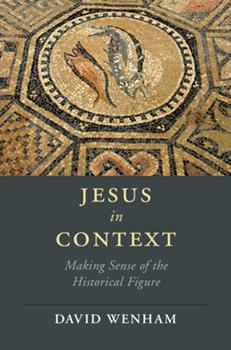Q. Who do you see as the audience for this book? I ask because it has a very clear historical orientation in terms of focusing on what we can know with reasonable certainty about the historical Jesus. It is neither an exercise in apologetics nor in skepticism.
A. I suppose I saw it as a course book for college students doing a course on ‘Religion, Philosophy and Society’, giving basic information about what we know about Jesus and about scholarly thinking. But at the same time I hoped that it might be of wider interest to anyone wanting a sober and sensible summary of Jesus-studies; I also hoped optimistically that it might restate some things that I would love to see the scholarly world taking more seriously, notably about the importance of oral tradition in the early transmission of the story of Jesus.
Q. There are some surprises along the way in the book. For example, there seems to be no real discussion of the two very different stories in the birth narratives both of which seem obliged to mention and comment on the miracle known as the virginal conception. I ask because in that honor and shame culture it seems very unlikely that such a story would be made up as it presents as many problems as possibilities to the fledgling Jesus movement, and as we know later Jewish critique indeed suggested that Jesus was illegitimate, possibly even the progeny of a Roman soldier named Panthera and Mary.
A. Much of what I describe about Jesus in the book is widely accepted in some form or other as having a historical basis; the stories of Jesus’ conception and birth are much more controversial, or simply not taken into account in many scholarly studies of Jesus’ life. They are in some respects a difficult – relatively weak? – point to start a book that wants to say that we have good historical information about Jesus. They are seen by many critics as theological (which they certainly are) and as similar to Jewish midrash, with major Christian scholars such as Raymond Brown and recently Andrew Lincoln raising serious questions about their historicity. I think that they have a case, and it was important for me in summarizing scholarly views to describe that view. On the other hand, there are actually good reasons for seeing the narratives as historical which I hope I bring out: for example, Luke’s prologue with its emphasis on eyewitness reliability immediately precedes his nativity story (which Paul may well have known, Galatians 4:4,5); Matthew’s portrayal of Herod and the magi is historically plausible; and yes the Jewish accusations of Jesus’ birth being illegitimate may be a response to the Christian story of the virginal conception.. There is a good article by Charles Quarles on the infancy stories, in Memories of Jesus edited by Stewart and Habermas .












